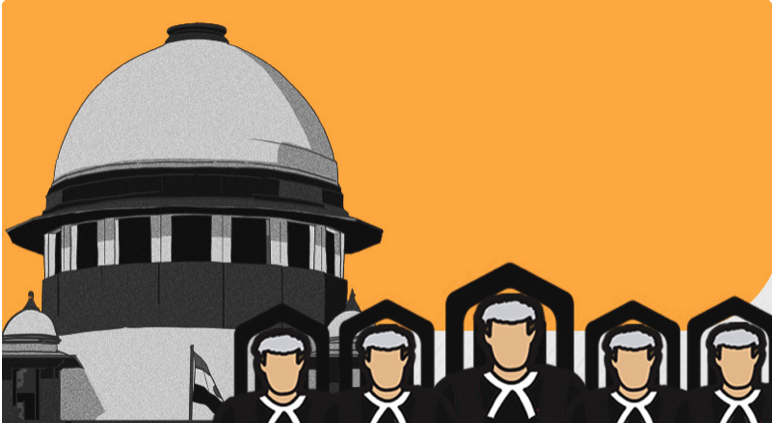The Higher Judiciary and the Collegium Paradox
Judicial coup falls under this category. It implies unconstitutional usurpation of power by the judiciary
Total Views |

The Supreme Court has lowered its image in the eyes of the common citizens by its haughty conduct. By doing away with the vacation bench during the winter-break, it has behaved like a petulant brat – “How dare do you question us about our holidays? We are our own masters; and just to prove it, we will shut the Court totally during the winter break. What can you do?”
Sadly, many people have started equating the Supreme Court with the proverbial meddlesome mother-in-law who contributes little but keeps needling others.
The Collegium System is a Judicial Coup
In broad terms, a coup is defined as an illegal seizure of power. Whereas coups are generally associated with the overthrow of constitutionally established governments by the military, there are many other types of unilateral seizures of power. As per the Wikipedia, such transgressions are called ‘coups with adjectives’. Judicial coup falls under this category. It implies unconstitutional usurpation of power by the judiciary. The collegium system is nothing but a de facto judicial coup with serious constitutional implications.
India is a republic in which we, ‘the people of India’, exercise the supreme power of governance. We delegate this power to our elected representatives and hold them responsible for their performance. Periodic elections give us an opportunity to elect or reject them on the basis of the results delivered by them. Judiciary does not represent us. We do not elect it. It is not answerable to us. If that be so, usurpation of power of governance by judiciary amounts to depriving the people of their power that is enshrined in the constitution.
Unquestionably, the collegium system is an anathema to democracy and is symptomatic of acute judicial superciliousness. In fact, it smacks of unbridled arrogance. In no country does the judiciary set aside the acts passed by the legislature and appropriate to itself the right to legislate laws. When the Supreme Court annulled the National Judicial Appointments Commission (NJAC) Act and the 99th Constitutional Amendment in October 2015, it dealt a death blow to the constitutional propriety. The then Finance Minister, Arun Jaitley, rightly called it “tyranny of the unelected”. It was a black day for the Indian democracy.
Although both the houses of the Parliament had supported the bill unanimously and 20 state legislatures had also passed it, unfortunately, the government failed to challenge the Supreme Court. Instead of taking a stand against the ruling, it opted to follow the path of conciliation. Perhaps, it did not want to annoy the Supreme Court, fearing that an antagonistic judiciary can create immense impediments by unwarranted interference in routine governance. Hence, it failed to reassert the power of the Parliament.
Article 124(4) of the Constitution provides for the impeachment of judges on the grounds of proved ‘misbehaviour or incapacity’. In another judgment (Krishnaswami v. Union of India: 1992 (4) SCC 605), the Supreme Court had ruled that the scope of the term ‘misbehaviour’ includes wilful abuse of constitutional office. Usurpation of jurisdiction over the legislative powers of the Parliament was undoubtedly a wilful abuse of the constitutional office. The judges were fully aware that the Constitution does not envisage the Parliament to be subservient to the judiciary. Yet, in an open assault on the basic tenets of the Indian Constitution, they ruled that the will of the judges is supreme and not the ‘will of the people’.
In addition to the above, judicial propriety demands that a judge must recuse himself and not sit on a bench that is considering issues that impact his personal interests. Surprisingly, despite being a party to the dispute, not a single judge expressed any reservations while deciding the case in its own favour (collegium).
If the Supreme Court felt strongly about the NJAC Act, it should have approached the President to constitute a committee of eminent jurists and legal luminaries to strike a balance and find the middle ground.
Interestingly, brazenness of the top judiciary is amazing. The Supreme Court wants to know the procedure followed to select an Election Commissioner (a matter totally outside its domain) but declines to share the details of the collegium’s deliberations, terming them as their internal matter. No wonder that the collegium is variously, and often, disparagingly referred to as a ‘Cosy Coterie’ or ‘Chacha-Batija Club’ or ‘The Inner-Circle’ or ‘The Kitchen Cabinet’.
Masquerading as Demi-Gods
The judges suffer from a misplaced delusion that they know everything better than the others. Pray, what are their credentials? They pass a law examination, practice in a court for a few years under a mentor and thereafter get elevated to the bench through the machinations of the collegium system. Once ensconced in the mighty chair, they start masquerading as demi-gods and consider themselves to be the repository of supreme knowledge and wisdom – they know how oxygen should be distributed; they are experts in the administration of vaccines; they decide the height of handi in dahi-handi; they know whether women should be allowed in the temples; they rule whether Jallikattu is a traditional sport or not; they want to decree as to what all tasks and ranks should be given to women in the military. The list is purely indicative.
The judges meddle in virtually every field. They want to be convinced that Rafale is a better aircraft than Eurofighter. Is it the function of the courts to ascertain which defence system should be procured and at what cost? They question economic policies of the government. What have the courts to do with demonetisation? If this trend continues, the courts may soon seek details of budget formulation as also rationale for taxes and expenditure.
The judges are legal luminaries and should confine themselves to legal matters only. Forgetting the distinction between social evils and matters of faith, they unnecessarily generated animosity amongst various sections of the populace in the case of Sabarimala. Their ill-advised intervention in Shaheen Bagh blockade and the farmers’ agitation created immense problems for the government and restricted its manoeuvrability to find speedy solutions. Some of their verbal remarks on unrelated matters surprise all.
PIL Conundrum
‘Public Interest’ is the most abused taxonomy. Filing of PIL is an industry and a remunerative one at that. A vast eco-system is thriving on it. There are experienced PIL litigants who can get any PIL admitted for a price, manage an early hearing and obtain a stay. There is a coterie of senior well-connected advocates who thrive on such litigations. They get paid handsomely by foreign-funded NGOs for prolonging the stays.
Innumerable infrastructural projects have been delayed by such subterfuges. Stays are obtained on infructuous grounds by the elements inimical to the development of the country. It takes years and numerous hearings for the courts to clear them. As a consequence, the country pays dearly for time and cost overruns. In short, PILs have become a handy, albeit Machiavellian, tool in the hands of the vested interests to impede national progress. In addition, they are brazenly used to settle political scores.
On 16 December 2022, while justifying admission of PILs, a bench headed by the Chief Justice asserted, “No case is small for the Supreme Court”. If that be so, why did the four senior-most judges of the Supreme Court hold a press conference in January 2018 to assail the functioning of the Supreme Court? The four unhappy judges complained that they were being assigned less important cases. Apparently, they wanted high profile and not small cases.
As a soldier, I was most disappointed with the Apex Court’s ruling of July 8, 2016 wherein registration of FIR against armed forces personnel, even in disturbed areas under Armed Forces Special Power Act, was made mandatory for every encounter death. Whereas all nations empower their soldiers to vanquish enemies of the state, our judiciary takes pride in shackling them.
When the judiciary passes such orders, it is seen to be backing the forces hostile to Indian interests, leaving soldiers aghast and shocked. A serving officer commented wryly, “The Supreme Court has given us two options – ‘get killed and the country will honour your martyrdom’ or ‘kill the terrorist and face judicial witch-hunt for years’.” India must be the only country where killing of the enemies of the nation is subjected to judicial reviews.
Apathy towards Responsibility
As per the statement of the Law Minister in the Rajya Sabha, a total of 71,411 cases were pending in the Supreme Court as on 02 August 2022. Out of these cases, more than 10,491 are awaiting disposal for over a decade. In addition, 59 lakh cases are pending in the High Courts and over 4.1 crore cases are pending in the subordinate courts in the country.
Our judges never tire of invoking ‘public interest’ while spending days on frivolous appeals while the backlog of genuine cases keeps piling up. Justice delayed is justice denied. When the courts delay settling cases, they are doing immense disservice to the litigants. Are the litigants not public? Is it not a matter of public interest that the cases be heard speedily and settled? Why no judge ever talks about this aspect of public interest?
Whenever the judiciary is questioned about the pending cases, the standard excuse is ‘there is a shortage of judges and the government is responsible for it’. It is partially true. But, what about the functioning of the existing judges? What efforts have been made by them to expedite disposal of the cases? Have they increased their working hours? Have they curtailed their long holidays?
Finally, the Irony
As a common citizen, I pay taxes to finance pay and perks of the judges, both during their service and after retirement. They trample upon my rights enshrined in the constitution; declare themselves to be above the Parliament; appropriate to themselves the right to legislate; create a comfort club called the collegium to appoint themselves through a well-established system of patronage (you look after my progeny and I will look after yours); keep the proceedings of the collegium secret; and, worse, take offence when asked about the mountains of pending cases.
We, the citizens of this country, cannot ask the judiciary as to why it is not doing its duty by disposing off cases speedily. One really wonders as to how their conscience allows them to enjoy extended holidays when thousands of cases that are more than 10 years old are crying for their attention. When they deny the right of speedy justice to the public, what justification do they have in invoking public interest when admitting highly subjective PILs.
The Supreme Court is an institution that must remain beyond any reproach. The country can ill-afford to have a judiciary that lacks credibility. People must not lose faith in it. Therefore, it must redeem its standing and reputation by five simple steps – (a) shelve the collegium system and accept NJAC; (b) stop meddling into the executive functions of the government (c) admit PILs selectively and in rare cases; (d) restrict all bail petitions up to the High Courts; and (e) expedite disposal of cases in a time-bound manner, disallowing undue adjournments, increasing daily court hours, working on Saturdays and reducing holidays.
Finally, it is time that the top judiciary pauses and introspects. To start with, it must understand that it is not empowered to administer the state. For, only people’s elected representatives get mandate to govern the country; and that is the essence of democracy.


